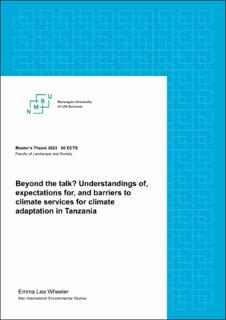| dc.description.abstract | We are talking a lot...but can farmers rely on this?
- NGO representative, Morogoro, Tanzania
This thesis examines the complexities and potential misalignments between the aim of co- produced climate services (CS) and the perspectives, livelihood realities, and practical challenges such services must address if they are to achieve the goals and objectives associated with strengthening climate adaptation amongst smallholder farmers. Countries, such as Norway, support and promote the provision of co-produced climate services for climate adaptation under the assumption that enhanced climate information will support local adaptation efforts. Co- production is advocated as a way to bring together the relevant actors involved in producing, communicating, and using CS to overcome the limitations of top-down approaches and increase user relevance and uptake of these services. However, as illustrated by the opening quote, despite efforts toward achieving co-production, a gap exists between the “talk” of scientific research and the actual impact it has on informing smallholder farmers’ climate adaptation in practice.
Through exploration of diverse understandings of, expectations from, and barriers to co- produced climate services for climate adaptation in Morogoro Region, Tanzania, findings in this study push back on the assumption that increased climate information, even when tailored to the assumed needs of recipients, inherently leads to enhanced climate adaptation. Perspectives of smallholder farmers and other stakeholders involved in producing, communicating, and using climate information show that how, when, and if climate information is useful and usable varies depending on individual and subjective backgrounds, experiences, ways of knowing, and decision-making contexts. Institutional and social barriers to access of information, as well as existing vulnerability among smallholder farmers in the studied locations, further limit the extent to which climate information and services, even when potentially useful, are operationally used. Despite widespread donor and governmental support for co-produced climate services in Tanzania and elsewhere, there remains a lack of convincing evidence for the uptake of such services by smallholders in ways that can support enhanced decision-making and climate adaptation in practice. Drawing on empirical data collected during participatory observation of a climate services co-production workshop, I investigate the different ways in which stakeholders understand and approach the process of climate service co-production and the different assumptions and expectations they bring to such processes. I further draw on qualitative
iv
interviews conducted with men and women smallholders and potential climate service intermediaries at local, national, and international levels to investigate the extent to which the seasonal forecast information that is currently produced at the national level is viewed as being accessible, relevant, trustworthy, and actionable and responsive to farmers needs in practice. To analyze the data, I employ a hybrid conceptual and analytical framework based on principles of “salience”, “credibility”, “legitimacy” (Cash et al., 2003) and “usefulness” and “usability” (Lemos & Morehouse, 2005) that have emerged from literature assessing the key criteria for enabling scientific information to inform and support adaptive action across the science-policy- society interface. | |
